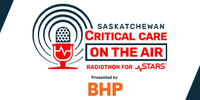Statistics from the Canadian Mental Health Association (CMHA), through a survey conducted by Maru Voice Canada, found that 53% of 1,510 Canadians aged 18 and up believe that anxiety and depression is an epidemic in Canada.
Among 18 to 34 years olds, that number jumps up to 59%. In comparison, 56% of those surveyed believe addiction to be an epidemic, 50% believe cancer and other physical illnesses to be an epidemic, heart disease and stroke 34%, 31% say diabetes is, and 13% say that HIV/AIDS is also an epidemic.
These numbers can leave someone wondering why anxiety and depression top this list, especially compared to these other topics.
"Sometimes people ask me why is [mental health] becoming so much more visible than what we ever experience before and there's a couple of reasons why that is," Donna Bowyer, Director of the CMHA Moose Jaw Branch, explained. "One is that we're talking more about mental health and maybe some people are feeling a little safer in disclosing that they are struggling."
Even though she said more people are talking about it, Bowyer said there's a flip side to it, and that we have become more of an isolated society and spend more time by ourselves. That we don't interact with our neighbors and don't have the same sort of communities that we used to have.
To offset this lack of connection, some people are now searching for professional help, but long wait times due to underfunding of community-based mental health services and the high prices of psychiatrists aren't getting people the help they need when they need it.
Which is why along with this survey, a national CMHA policy paper was also released, called Mental Health in the Balance: Ending the Health Care Disparity in Canada. With the survey numbers in the paper, they are also calling for new legislation to "address unmet mental health needs and bring mental health care into balance with physical health care."
85% of Canadians say mental health is the most underfunded component in the health care system, and 86% say the government should fund mental health at the same level as physical health.
The Mental Health Commision of Canada recommends 9% of the health budget be put towards mental health, but currently Canada only averages 7%, and Saskatchewan sits below at 5%.
In a news release from the CMHA, it states mental health accounts for 23% of the total disease burden, and by 2020, depression will be the leading cause of disease in Canada.
"There's been a lot of studies in that done that, you know, if we can capture these issues up front, if we can get the services we need when the services arrive, it's going to reduce the cost on the system," Bowyer said. "Every dollar spent on public funding of mental health services would save two dollars in the health care system."
Bowyer goes on to say that many mental health services that people assume to be in place aren't anymore. Some people think that kids can get counselling through their school system, but that has changed in the past two years due to funding cuts. Or the new hospital being built in Saskatoon having no unit for children dealing with mental health.
Anyone who needs mental health help can utilize the CMHA peer support group here in Moose Jaw, which gives people more face-to-face help and allows them to spend more time with others, showing compassion and caring about how people are doing.
If you want to learn more about the CMHA's findings and their call to legislation, you can find their full report here, or the summary here.


















